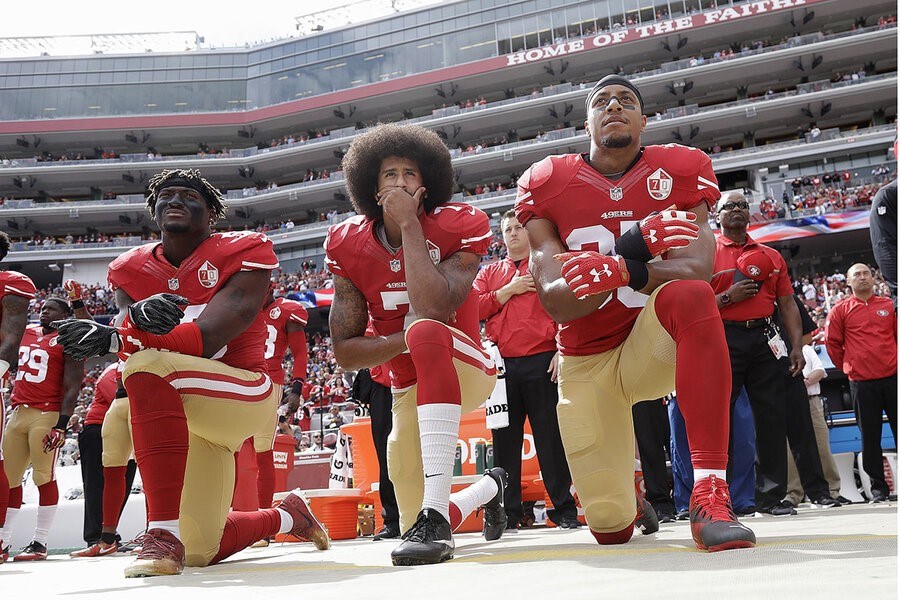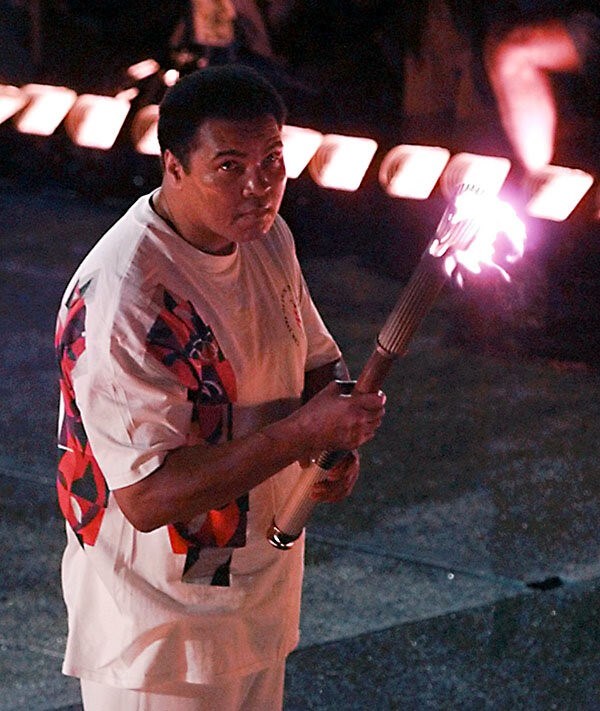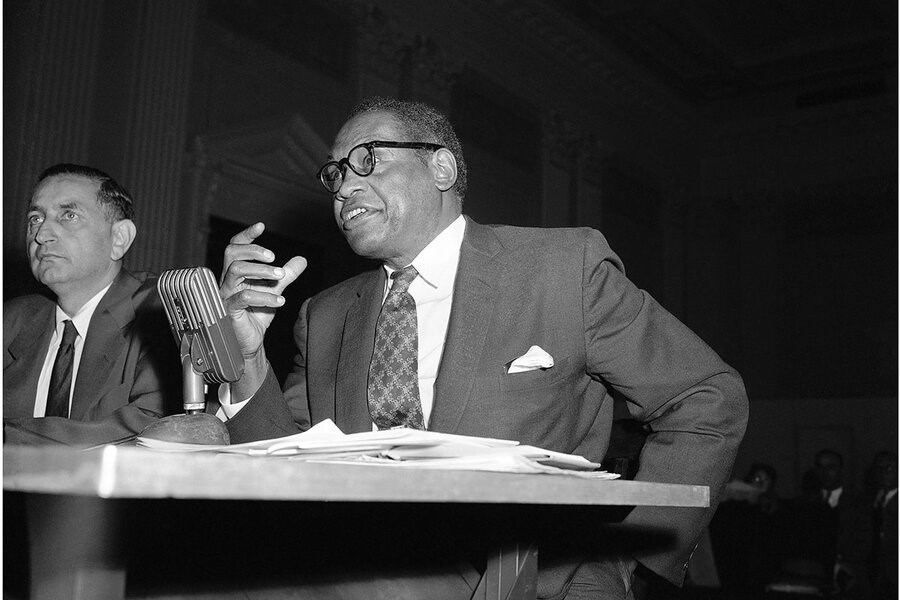REPRINTED WITH PERMISSION FROM THE CHRISTIAN SCIENCE MONITOR
 San Francisco 49ers' outside linebacker Eli Harold (left), quarterback Colin Kaepernick (center), and safety Eric Reid (left) kneel during the national anthem before an NFL game in Santa Clara, California, Oct. 2, 2016. Mr. Kaepernick was vilified by people who considered kneeling an offense against the country. Marcio Jose Sanchez/AP/File
San Francisco 49ers' outside linebacker Eli Harold (left), quarterback Colin Kaepernick (center), and safety Eric Reid (left) kneel during the national anthem before an NFL game in Santa Clara, California, Oct. 2, 2016. Mr. Kaepernick was vilified by people who considered kneeling an offense against the country. Marcio Jose Sanchez/AP/File
March 16, 2023
The greatest athletes throughout sports history are often recognized for clutch performances on the field of competition. Timely play isn’t just a mark of a champion, but also the barometer with which greatness is marketed.
However, that sense of appreciation is often lacking when it comes to athletes who make relevant stances off the field. Where we instantaneously cheer a game-winning touchdown or a silky shot in sync with the sound of a buzzer, it might take decades, if at all, for us to honor sports figures who are also activists for social justice.
Colin Kaepernick, the former San Francisco 49ers quarterback turned publisher, fits this dichotomy well. Even in his recent promotion of a new graphic novel, his commentary drew controversy. I can’t help but look at the man who was a play or two away from winning the Super Bowl, and seeing a near twin and kinsman in basketball player Mahmoud Abdul-Rauf, who was similarly blackballed in his athletic prime.
I was a teenager back in 1996 when Muhammad Ali raised the torch as a precursor to the Atlanta Summer Olympics. I distinctly remember the cheers and reverence for “The Greatest.” But the graciousness of that day belied the rhetoric that surrounded Ali in the 1960s, when he was criticized for his religious beliefs and anti-war stance.
 Doug Mills/APMuhammad Ali holds a torch as he watches the flame climb up to the Olympic cauldron during the opening ceremony of the Summer Olympics in Atlanta, July 19, 1996. The crowd cheered, but in the 1960s the boxer had been criticized for his religious beliefs and anti-war stance.
Doug Mills/APMuhammad Ali holds a torch as he watches the flame climb up to the Olympic cauldron during the opening ceremony of the Summer Olympics in Atlanta, July 19, 1996. The crowd cheered, but in the 1960s the boxer had been criticized for his religious beliefs and anti-war stance.
“My conscience won’t let me go shoot my brother, or some darker people, or some poor hungry people in the mud for big powerful America,” Ali famously said as a conscientious objector who later refused to serve in the Vietnam War.
Profiles in courage
“Profiles in Courage” is the name of John F. Kennedy’s Pulitzer Prize-winning volume of biographies chronicling acts of fortitude from eight United States senators. A similar anthology could be outlined for the likes of athletes such as Bill Russell, Curt Flood, and Paul Robeson, among many others.
Ali’s criticism of this country and its establishment was a profile in courage because of what it cost him. At one point he was considered by many to be the most hated man in America.
But athletes can do more than inspire through their imagination and creativity. They can also change lives.
Flood was an All-Star and multiple Gold Glove winner for the St. Louis Cardinals. But in 1969 he attacked a rule that was at the heart of baseball: A team owned a player his entire career, and there was nothing the player could do about it. So in 1969, he sued, telling the commissioner, “I do not regard myself as a piece of property to be bought or sold.”
By 1976, his protest had brought an end to the old order with the advent of free agency. But his career collapsed. In 1992, Flood received the NAACP Jackie Robinson Award for contributions to Black athletes.
These stands on moral grounds can represent some of the best of the human spirit, even if not appreciated in real time.
Take Robeson. In the 1910s and ’20s, he was class valedictorian at Rutgers University, an All-American football player who got his law degree from Columbia University while playing in the National Football League; an actor, a singer, and a prominent figure in the Harlem Renaissance.
But Robeson has been relegated to obscurity because of his pro-Black and anti-colonial views. When he was called to testify at a House Un-American Activities Committee hearing in 1956, he expressed a sentiment similar to Ali’s.
 Bill Allen/APFamed baritone and football player Paul Robeson testifies in Washington before the House Un-American Activities Committee, June 12, 1956. He said, “I stand here struggling for the rights of my people to be full citizens in this country."
Bill Allen/APFamed baritone and football player Paul Robeson testifies in Washington before the House Un-American Activities Committee, June 12, 1956. He said, “I stand here struggling for the rights of my people to be full citizens in this country."
“I stand here struggling for the rights of my people to be full citizens in this country. And they are not. They are not in Mississippi. And they are not in Montgomery, Alabama. And they are not in Washington. They are nowhere, and that is why I am here today,” Robeson said. “You want to shut up every Negro who has the courage to stand up and fight for the rights of his people, for the rights of workers, and I have been on many a picket line for the steelworkers, too. And that is why I am here today.”
Robeson was destined for conflict with the United States government due to his socialist views and connections with the communist Soviet Union. Consequently, he is a quintessential example of how Black activism in sports can get diverted – focusing on other issues to leave the core questions unanswered.
Jackie Robinson is undeniably one of sports’ greatest pioneers, courageous in his own right. Yet, in the face of the political accusations against Robeson, the man who broke baseball’s color line testified against Robeson, an act he said he regretted in his autobiography:
“I would reject such an invitation if offered now,” Robinson wrote in “I Never Had It Made.” “I have grown wiser and closer to the painful truths about America’s destructiveness. And I do have increased respect for Paul Robeson who, over the span of twenty years, sacrificed himself, his career, and the wealth and comfort he once enjoyed because, I believe, he was sincerely trying to help his people.”
Sports as a stage
Sports is more than a platform for entertainment, or even self-promotion. Some athletes understand that sports provide a stage to speak about societal wrongs, to demand change for all people – and that is a different definition of “The Greatest.” Winning games might give these athletes a louder voice, but it is secondary to lasting change.
Is it too much to ask for such courage to be appreciated in athletes’ own time?
Mr. Kaepernick’s stance against police brutality certainly came at the cost of his career. He has not played another snap since the season he protested against police brutality. Various protests from NFL players, including Mr. Kaepernick, in response to the deaths of Michael Brown and Tamir Rice put them at odds with police unions and other pro-military groups.
I remember those protests distinctly, as they helped to put the #BlackLivesMatter hashtag on the national stage. Some people viewed them as inconveniences – or intermissions. But when we begin to see the courage of these athletes through a different lens, then we see protest as more than a break in the action, but bigger than the game itself.
Related stories
Page created on 3/21/2023 6:40:53 PM
Last edited 3/21/2023 6:59:35 PM
